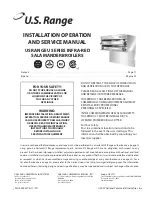
ATMOS MULTI version 2002
Page 14
6.3 Flue terminal clearances.
The flue terminal must be sited
with minimum clearance distances
as specified in figure 3
.
A
terminal guard (available from
Atmos Heating Systems) must be
fitted if the terminal is sited less
than 2m above ground level.
Where the flue terminates within
1m of a plastic or painted gutter or
within 500mm of painted eaves
then protection should be
provided in the form of an
aluminium shield at least 1m in
length, fitted to the underside of
the gutter or painted surface.
Please note !
Due to the low flue gas
temperature, 'pluming' will occur
at the flue terminal. Care should
be taken to ensure that the
discharge plume will not cause
annoyance to the customer or
neighbours. It is generally
recommended that flues should
discharge vertically at roof level,
where pluming is not normally a
problem
6.4 Flue system.
The flue system must be installed
in accordance with BS5440:1.
Horizontal flue gas discharge pipe
runs must always be installed
with a minimum 0·5% incline
towards the point of termination.
This incline will prevent
condensation from gathering in
the flue gas d ischarge pipe, and
will also reduce the chance of
icicles forming over horizontal
pipe ends in extreme weather
conditions. On horizontal
terminations the air supply pipe
must be led to outside with a
minimum 0·3% angle to prevent
the ingress of rainwater. Similarly,
provisions should be made to
prevent the ingress of rainwater
into the air supply pipe on
vertical terminations.
Figure 3: Flue terminal locations
Depending upon the boiler location and flue configuration required, two
different flue systems are available for use with the Atmos Multi boiler:
q
125/80mm concentric system for use on vertical roof systems up to
a maximum equivalent length of 64m, and;
q
80/80 twin pipe system which enables separate air intake and flue
gas discharge pipes to be fitted to the appliance, allowing a
combined total equivalent flue length of 64m
The maximum equivalent flue length of the flue system must not be
exceeded. If exceeded the boiler will not malfunction but its heat-output
capacity will be reduced. The connected gas/air regulator will however,
always ensure optimum combustion is maintained.
Examples of various flueing options and configurations are given in
figure 4.
Summary of Contents for Multi 24/80
Page 1: ...ATMOS MULTI version 2002 Page 1 ...
Page 2: ...ATMOS MULTI version 2002 Page 2 ...
Page 6: ......
Page 8: ...ATMOS MULTI version 2002 Page 8 ...















































